Pakistan polls disappoint, add to instability

Pakistan's election has been remarkable in producing a result disappointing to most of its foreign partners and rivals, with little reason for optimism about government that will eventually emerge from it, foreign policy analysts said.
Pakistan's two largest political parties have been wrangling over who will be prime minister after an inconclusive vote last week forced them to join forces and try to form a coalition in a parliament dominated by independents.
Neither former Prime Minister Nawaz Sharif's Pakistan Muslim League-Nawaz (PML-N), nor the Pakistan Peoples Party (PPP) of Bilawal Bhutto Zardari, son of assassinated former premier Benazir Bhutto, won enough seats to form a government alone.
Independent candidates backed by former Prime Minister Imran Khan represent the largest group, with 93 of the 264 parliamentary seats declared. That shocked many, who had expected their showing to be severely dampened by an intense crackdown on Khan and his party.
But Khan cannot become prime minister as he is in jail and his grouping cannot form a government as they nominally ran as independents as his party was barred from standing.
Some foreign policy analysts said the election results likely indicate voters' protest against perceptions of the country's powerful military's involvement in politics. But the military denies it interferes in the country's politics.
That adds to the political instability given the military's strong historic role in the security and foreign affairs of the nuclear-armed nation.
"Pakistan has been on a slippery slope for some time but a mild one. The slope is now much stiffer," said Frederic Grare, a South Asia expert at the Australian National University's National Security College.
"The military will most likely be able to manage the situation for some time but ... the political situation is likely to be less and less stable."
It's a messy scenario no one wanted - not China, Pakistan's main foreign backer, not India, Pakistan's nuclear-armed neighbour and bitter rival, nor the United States, which has a reduced stake in Pakistan after quitting Afghanistan in 2021, but remains concerned about Islamist militancy as a broader source of instability in the region and beyond, analysts said.
The prospect of a weak, divided government also raises questions about whether Pakistan will be able to undertake reforms needed to secure a vital new International Monetary Fund program later this year. Last week, the US, Britain and the EU separately expressed concerns about Pakistan's electoral process and urged a probe into reported irregularities. Pakistan's caretaker prime minister rejected those allegations.
'MORE CONFUSION AND UNCERTAINTY'
Tamanna Salikuddin, South Asia director at Washington's United States Institute of Peace think tank, said that rather than resolving the political crisis Pakistan has been plagued with since Khan was ousted in 2022, the election "has created more confusion and uncertainty."
"This election not only reveals the lack of trust that Pakistanis have in their leaders, but also it is evidence that no institution or leader has a plan to fix the economy, nor do they have the political capital to make any of the very difficult and painful reforms to turn around this failing economy," she said.

 For all latest news, follow The Daily Star's Google News channel.
For all latest news, follow The Daily Star's Google News channel. 



Comments